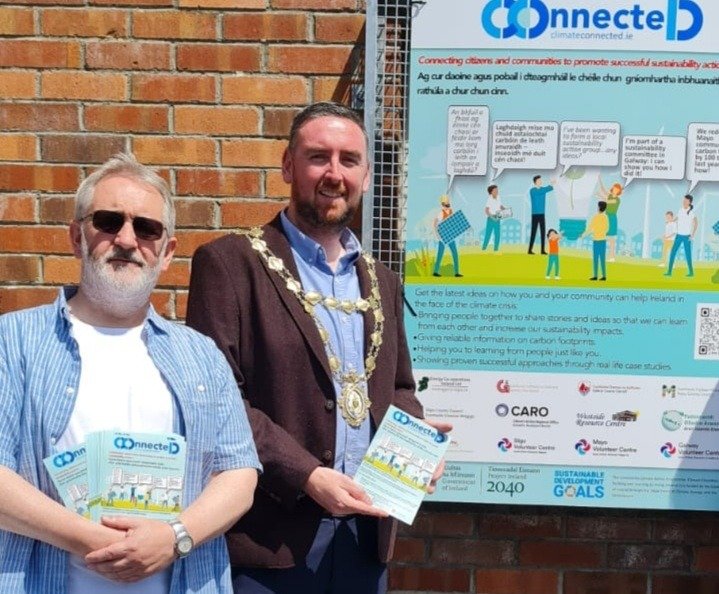
James Coyne of Westside Resource Centre with Mayor of Galway City, Councillor Mike Hubbard, at the Climateconnected information stand at the Westside Arts Festival
HIGHLIGHT:
In this podcast, Maeve from the Climate Connected series speaks with James Coyne, the CEO of the Galway Westside Resource Centre, about how his community-focused organisation is tackling climate and environmental issues from the ground up.
The Westside Resource Centre is a hub for the community where people can find resources and make connections to help kickstart their sustainability actions – there are resource centres and community hubs throughout Ireland: find yours and start your own action.
The resources and templates are available through the climateconnected.ie site HERE, offering a powerful and replicable blueprint for other communities across Ireland and beyond.
Your Community Centre Can Help Begin Your Sustainability Journey
Summary: A Community Hub’s Approach to Climate Action
(900 words – a 4-minute read):
A Resource Centre is more than a building
The Westside Resource Centre was established in 1994 in a less affluent area of Galway City, with deep community development roots. Its core mission has always been to help disadvantaged individuals, schools, and community groups. James Coyne has been involved for 17 years and explains that the centre operates as a social enterprise, partially funded by the government but also charging for its services.
It acts as a vital hub, housing a diverse cluster of organisations—from childcare services and groups supporting older people or new communities, to environmental and Traveller community organisations. The centre’s very purpose is to be a focal point for connection and collective action.
Westside Decarbonisation Zone
Westside was chosen by Galway City Council as its Decarbonisation Zone (DZ). This is a government initiative where each local authority picks an area to have higher climate targets than the national average. These zones act as test-beds or pilots for new ideas and projects. Hopefully, when successful, an approach can be rolled out across the country to other areas. James sees this as an opportunity to attract interesting and beneficial projects to the Westside community.
Key Sustainability Projects in Westside
Several projects have sprung from the DZ designation and the centre’s own ethos:
“The Air We Share”: This project focuses on making the invisible problem of air qualityhow clean the air is visible. It combines science and art, working with scientists from the University of Galway and local artists.
- Scientific Monitoring: An array of air quality monitors has been installed in the area. The data already shows clear patterns, with pollution peaking during rush hour and changing with calm weather, where particles aren’t dispersed by wind.
- Art Events: Artists work with the community to creatively explore the issue, resulting in a public exhibition. James emphasises the importance of including community voices in such projects, as people face real challenges, like a lack of public transport alternatives, which can make immediate change difficult.
The Westside Community Garden: This project started as a social initiative but has become a powerful tool for climate and environmental education. It’s a tangible, physical space where volunteers grow their own food, which tackles issues like reducing food air miles. The garden also naturally promotes biodiversity, becoming a home for hedgehogs and pollinators. Practical sustainability is built in, with features like a rainwater harvesting system. James notes that people engage with the garden for the community and social benefits, and the environmental values are absorbed naturally along the way.
Creative and Educational Programmes: The centre deliberately weaves climate conversations into its regular activities. It uses events like the Westside Arts Festival, Culture Night, and Bike Week to raise awareness in a fun, accessible way. They have hosted community education classes, public talks, and creative projects like “Painting the Planet,” which explored the UN Sustainable Development Goals. A key success was a climate action course specifically designed for the over-60s age group, one of the first of its kind in Ireland.
The Inclusive Approach
The Resource Centre has a focus on community engagement. James believes in a positive, creative, and non-intimidating approach.
Avoid Overwhelming Guilt: James acknowledges that many people feel the climate crisis is too big and that they, as individuals, are powerless. He argues against “beating people over the head” with the issues, which can lead to guilt and disengagement.
Celebrate Small Steps: He stresses the importance of valuing and celebrating the steps people are already taking, whether it’s cycling, recycling, gardening, or conserving energy. He recalls a lady who cycled everywhere and volunteered in the garden, but didn’t see her own actions as meaningful contributions. The centre’s role is to highlight and praise these efforts.
Meet People Where They Are: The centre offers diverse entry points. Some people prefer the hands-on work of the garden, while others engage through art, music, or educational courses. The goal is to be inclusive and harness the creativity and perspectives of all parts of the community.
Listen: James highlights the importance of listening to the community’s real-world barriers, such as the cost and disruption of retrofitting a home. Only then can we help direct people to the grants and support services that are right for them, acting as a bridge between the community and government agencies.
Conclusion: Small steps to begin your journey
James reflects that awareness of climate issues has grown significantly over his 17 years at the resource centre. His advice to other communities is to start small, look for collaborative opportunities, be positive and creative with the message, and, most importantly, bring the voices of ordinary people into the conversation.
The activists’ takeaway
The Galway Westside Resource Centre demonstrates that effective climate action isn’t just about top-down policy; it’s about building a supportive, local ecosystem where people can come together, share ideas, and take action—one small, celebrated bite at a time. By focusing on tangible projects, creative expression, and a supportive community spirit, they are making the journey towards a sustainable future a shared and achievable endeavour.






